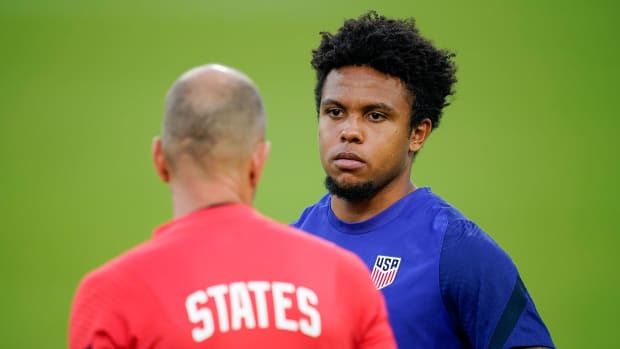Weston McKennie was banished from the U.S. men's national team during World Cup qualifying for breaking team protocol.
The U.S. men's national team is in the period in between World Cup qualifying windows, and one of the biggest questions looking forward is whether midfield star Weston McKennie will be brought back into the squad.
McKennie was omitted from the U.S.'s second match of the September window and then expelled before the third for breaking team protocol in Nashville. According to ESPN, McKennie spent a night outside of the team's COVID-19 bubble and brought an unauthorized individual back to his hotel room in the bubble on a different evening. U.S. Soccer left things short on specifics but deemed McKennie's actions a "violation of team policy" that resulted in his not playing vs. Canada and Honduras. McKennie was sent back to Juventus prior to the U.S.'s 4–1 win over Honduras and has returned to action to a degree for the struggling Serie A power. He started and played 72 minutes in a loss to Napoli in the first match after the international break and came off the bench for the final 22 minutes of a subsequent Champions League win over Malmö. He was left on the bench unused for the club's most recent match, a draw vs. AC Milan.
While he has been suiting up for Juve, it remains to be seen when the next time he'll get the chance to do so for his country will be. The door certainly appears to be open for McKennie, a member of the team's Leadership Council, to be brought back into camp ahead of next month's matches vs. Jamaica, Panama and Costa Rica, based on comments made by coach Gregg Berhalter. He explained the decision-making process and what comes next on U.S. Soccer's latest podcast episode.
"First and foremost is it’s an extremely difficult situation that you’re put in," Berhalter said. "You know that this is one of your top players. Not only that, but he’s a great kid. Everyone really cares for Weston. And there’s part of it that we’ve been around long enough to know that people make mistakes. Things happen and it’s not about holding it over their head for an extended period, but there should be consequences. And that’s what we kept going back to.

Andrew Nelles/The Tennessean/USA TODAY Network
"So when we learned of this, it was about just understanding first. The first thing I did is go to Weston and confronted Weston and say, 'O.K., did this happen?' And give him a lot of credit, he looked me in the eye and said, 'Yes, this did happen.' And I said, 'O.K. now let's talk about what’s next.' The first thing is this was the day of the game that we’re having this conversation and I said, 'You’re not going to be playing this game today. And it hurts me to tell you this, but that’s how it’s going to be.' And I think that gave us a little bit of time.
"But the next thing was where do you go from there? And then it was about talking to the staff about it and talking about what our values are as a group and what we represent. And as we were doing that it started to become more clear what the answer was, and again it’s not to hang Weston out to dry. It’s more of a message of listen, we’re in this intense period of trying to qualify for the World Cup, we all say this is what we want to do, and we know there’s going to be sacrifices that come along with it. When we have players that aren’t willing to make the sacrifices, there has to be consequences for it because there’s not a lot of room for error in this thing here. And so we talked with the staff and eventually we came up with the idea that he’s not going to be taking part of any more of the camp, and we’re going to have to move on without him this trip. In the end we felt strong about the decision, we felt sad for Weston but we focused on how do we win the next game after the Canada tie, how do we turn things around and win the next game?
"I hope the group understands," Berhalter continued. "We purposely didn’t go to the team and ask 'What do you think should be done?' Because I don’t think it’s fair to put that on the players to have to make a judgment or a ruling on another player in a circumstance like that. I think that’s our role as leaders. But I think from a player standpoint, for me to see that a coach is willing to act even though it may not be in his best interest and then once this is done it’s done. He’s not going to hold it against me. I think that’s a fair way to look at things. And so the reintegration part is everyone understood that if we call Weston into camp in October, he served his punishment so to speak. He has the right like any other player to be brought back into the team.
"Maybe I oversimplified it a little bit with the reintegration. There is a period I think where he’s going to have to earn both his teammates’ and the staff’s trust again. And I think that’s also fair. It’s not something where you say, 'O.K. we have amnesia, and we act like this never happened.' It did happen, and now it’s on him to earn everybody’s trust. But it’s not like he won’t be given the opportunity to do so."
More Soccer Coverage: